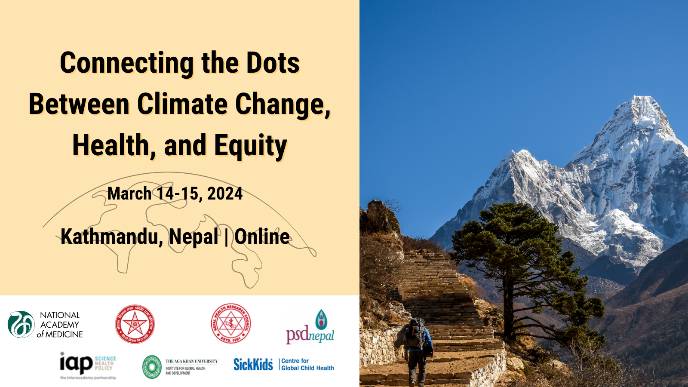The National Academy of Medicine (NAM), the National Academy of Science and Technology, Nepal, the IAP and partners are co-hosting a two-day workshop in Nepal and online.
The climate crisis has emerged as both a public health and equity crisis. South and Southeast Asia, in particular, face mounting challenges, such as increased vulnerability to extreme weather events, rising rates of water-borne and vector-borne diseases, worsening air pollution, and other climate-related hazards. Join us at “Connecting the Dots Between Climate Change and Health” in Kathmandu, Nepal on 14 and 15 March 2024. This two-day workshop highlights the science of climate change in the region and explores community-led health and equity solutions.

The National Academy of Medicine, the Partnership for Sustainable Development Nepal, the Nepal Health Research Council, the National Academy of Science and Technology, Nepal, SickKids Centre for Global Child Health, the Institute for Global Health & Development at The Aga Khan University and The InterAcademy Partnership are co-hosting a two-day workshop called "Connecting the dots between climate change, health, and equity".
Speakers:
- The Rt. Honorable Prime Minister Pushpa Kamal Dahal- Prachanda
- Victor J. Dzau, MD, President, US National Academy of Medicine
- Orania (Rania) Kosti, PhD, Executive Director, InterAcademy Partnership
- Bishnu Bhatta, Director, Partnership for Sustainable Development-Nepal
- Dr. Zulfiqar Bhutta, Founding Director, Institute for Global Health and Development, Aga Khan University
- Dr. Rabindra Dhakal, Secretary, Nepal Academy of Science and Technology
- Dr. Meghnath Dhimal – Chief Research Officer, Nepal Health Research Council
Objectives:
- Identify urgent needs, challenges, barriers and opportunities to address the health impact of climate change in the South and Southeast Asia region.
- Highlight and share best practices and policies on addressing the adverse impacts of climate change on health, gender disparities, and equity.
- Identify opportunities and strategies for regional partnerships to overcome climate-related health issues.
- Explore opportunities for regional commitments.
This event will be held in Kathmandu, Nepal and online. Register here.




